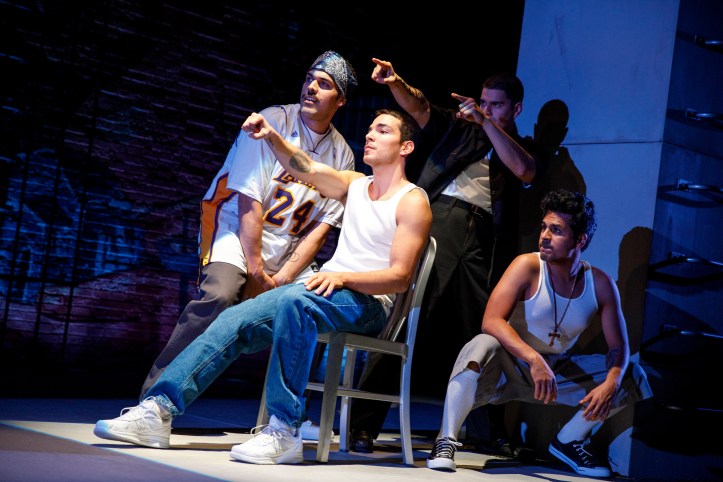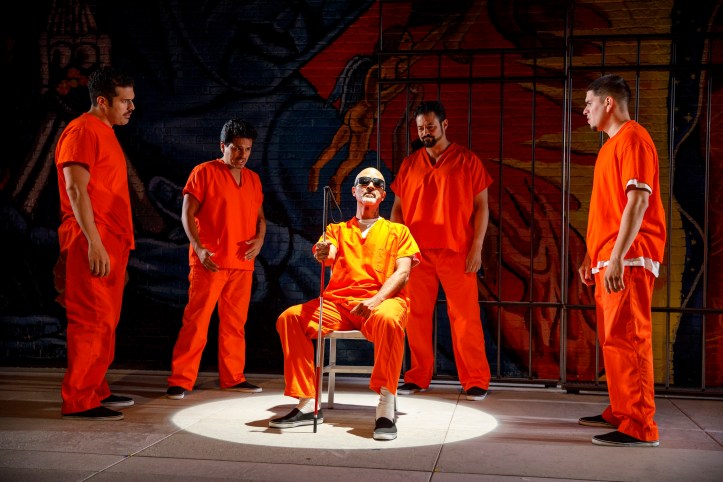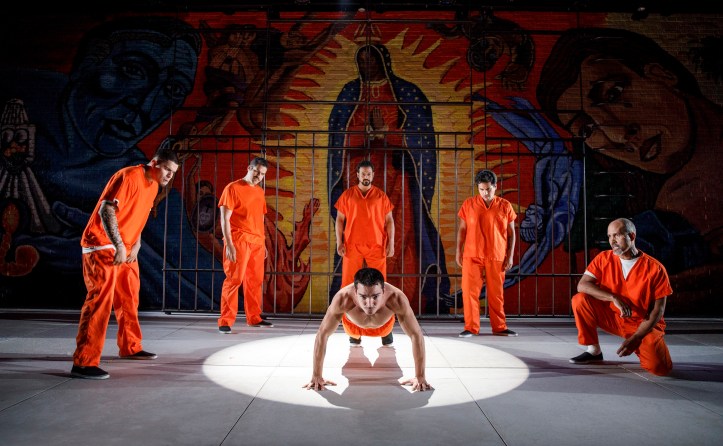
Oedipus el Rey: An Exciting Bare Assed Re-Focusing of Greek Destino y Amor Maternal.
By Ross
The painted wall and the panels of jailhouse bars tell a whole story before the first actor even jumps up onto the Shiva stage at The Public Theater. It’s a story of cultural imprisonment regardless of setting. How Greek tragedy and destiny equals American power dynamics and discrimination. In the thrilling new Oedipus el Rey, a beautiful and powerful mural with the Virgin Mary takes Center stage. It’s culturally specific and definitely Catholic, but by no means Greek. As Anna Deavere Smith spoke so extensively and powerfully about in Second Stage’s Notes from the Field as did Dominique Morisseau in Lincoln Center Theater’s Pipeline, so does the Public’s Oedipus el Rey, by layering underneath a growing Greek storm cloud of mythology, the rain and wind of the Latino pipeline. The societal ‘destiny’ leads these souls from “borders and beliefs” to violent gangs and prison. These characters are all living behind bars essentially, that slide into place regardless of where they find themselves. Is this fate, we are asked, or is it just systematic oppression?

Clearly, this is a SoCa Latino-flavored reimagining of the famous Athenian tragedy written by Sophocles (first performed around 429 BC). It is a hurricane of a story that has inspired a famed psychoanalytic complex and a whole stack of psychotherapeutic textbooks devoted to its relational meaning. This time though, it is brought to the stage by acclaimed playwright Luis Alfaro (Oregon Shakespeare Festival’s Mojada: A Medea in Los Angeles) with an extremely creative stance by director Chay Yew (Public’s Durango). The prisoners jump start the proceedings with a Greek chorus style barrage of quick sharp dialogue setting the thematic and stylistic stage for all that this storm will rain down on these people caught in the crossfire.

The play pulses with a rhythm much like a drive down a south central LA street with Latino infused urban anthems playing loudly from every passing car. One by one, we are introduced to the inmates and the roles they will be playing. It is as if we are about to see a prison production of this tragedy performed by a band of tattooed men, much like the female driven Tempest, Henry IV, and Julius Caesar that was performed at St. Ann’s Warehouse last year. But instead of the estrogen, we are given, courtesy of The Sol Project, an electrifying testosterone-fueled dissection of this famous tale, transcribed into a completely different and charged universe far from the ancient Greek world of Thebes. This modern day Oedipus, dropped swollen feet first into the Chicano gang culture of Southern California, is in the form of one very sexy Latino inmate jailed for illegal acts as a youth. This bare-chested angry young man will soon to be released into the modern world where fate and destiny awaits, and he goes by the name of Oedipus.

Swirling around the wild streets of South Central L.A., Oedipus is like a storm brewing, highly charged and powerful. Found standing defiantly in the middle of a circle of light, , surrounded by his less powerfully intoxicating peers, this Oedipus is a chiseled and strong young Latino man doing push-ups and sit-ups aggressively. Played confidently and intensely by the handsome Juan Castano, the talented actor, who gave 2ST’s Parallelogram some much needed heat and sexuality, does the same with this ancient plot.
We know his story from the very beginning. It is re-told efficiently and passionately by a stellar group of actors donning numerous different hats in and out of the prison setting. We are told and shown how Laius the ‘King’, strongly portrayed by Juan Francesco Villa (The Play About My Dad) discards Oedipus just after his birth. He tries with desperation to derail the prophecy that his son will grow up and murder him in a face-to-face duel, but only we seem to know how futile that is. Passing the infant boy off to his faithful right hand man, Tiresias, solidly played by Julio Monge (LCT’s Twelfth Night) to do the deadly deed, the King returns to ruling his neighborhood without fear or anxiety. The baby’s mother, Jocasta (Sandra Delgado) grieves for her lost son, but life goes on in this particular hood of South Central. The King is still King, and he rules his blocks ruthlessly.

Years later, in prison, Oedipus believes Tiresias, who couldn’t do what was asked of him so many years ago, is his father, and together doing time behind bars, they bond. Once released, as if pulled by god and destiny, or by some systematic oppression of the Latino man, he runs into his real father in the dangerous South Central of L.A. unbeknownst to either one or anyone else. And ‘like father, like son’, their hot headed-ness results in a hand-to-hand battle to the death, fulfilling one part of the prophecy, with the second part destined to be enacted upon.
We all know how this will turn out once the storm hits, but within this intricate retelling, we have a change of focus. Without imposing a different meaning on the old text, Alfaro asks a different dramatic question: where do we find the fire and intensity in this tale? He places the epicenter of the storm solidly around the more famous and compromised relationship, the one that Freud himself found most intriguing; the one between grieving mother and the son who brings back love and fulfillment into her world. The Jocasta-Oedipus love story has always existed but only by implication with the text, and here in this deeper examination, we find the electricity.

It doesn’t take long for Oedipus, with the reluctant help of an old prison acquaintance, Creon, to be unknowingly reunited with his mother. His friendship with Creon, poorly directed and played with comic silliness by Joel Perez (Fun Home, New Group’s Sweet Charity) is the least effective relationship and connection. How they know each other or why Oedipus seeks him out is only casually mentioned early on, forcing us to believe the coincidence mainly because we must. The real fire though is inside that home where Jocasta, brilliantly played by the fearless and fiery Delgado (Teatro Vista’s La Havana Madrid) mourns. The reunion is plain eruptive, sensual and erotic, both her and Oedipus stripping themselves naked before our eyes as they fall deeply into each other’s soul. Jocasta speaks of a void being filled by Oedipus, and we, the only ones privy to the incestual knowledge, hold our breath and wait. The outcome is destined.

The look and feel of this production is as simple as it is powerful. The streets of L.A. are brought to impeccably vitalic life by lighting designer, Lap Chi Chu (The Wolves), with exciting and dynamic original music and sound design by Fabian Obispo (Public’s Two Sisters and a Piano). With the impressive backdrop and creative use of sliding bars by scenic designer, Riccardo Hernandez (Broadway’s Indecent), and costumes by Anita Yavich (Broadway’s Fool for Love), the team is firing all engines driving the piece forward at a solid and aggressive pace.
The piece slows down a bit after the embrace and love making of the two central figures in a circle of white light. Maybe a lot of the power of this story is fueled by the coming of the storm, and once the eye of the hurricane is overhead, a quiet moment exists. There is a bit of fun theatrics with the oracles of the hood, and the riddle that we all know, and the stagecraft for Oedipus to solve it is solidly orchestrated. The battle with the serpent, as with most of the fights could use some tightening up (fight and intimacy direction by Unkle Dave’s Fight House) but the effects overall work their magic. By the end of the play, after the truth finally comes to light, Jocasta and Oedipus are destroyed. The patricide and incest is too horrific to withstand. As with all good ancient tragedies, the ability to control one’s own destiny, no matter how hard Oedipus tries to soar above, is found to be useless. The storm engulfed him, and he finds himself trapped, just like everyone else in this old story, by fate, history, violence, and love. No one is going to get out unscathed in Oedipus el Rey, this we know from the beginning, except for maybe all these wonderfully talented artists involved in this powerful and electrifying production.

[…] on October 24, 2017 by ross OEDIPUS EL REY Juan Castano, Julio Monge. Photo by Joan […]
LikeLike
[…] “Thrilling…The play pulses with a rhythm much like a drive down a south central LA street…The Jocasta-Oedipus love story has always existed but only by implication with the text, and here in this deeper examination, we find the electricity…The look and feel of this production is as simple as it is powerful…No one is going to get out unscathed in ‘Oedipus el Rey,’ except for maybe all these wonderfully talented artists involved in this powerful and electrifying production.” Full Review […]
LikeLike
[…] played with a manic energy by the always interesting and exciting Juan Castano (Public’s Oedipus El Rey), is a wrestler and up for a sports scholarship. His portrayal of this streetwise survivor is by […]
LikeLike
[…] Moeller (Public’s Tiny Beautiful Things), lighting designer Lap Chi Chu (Public’s Oedipus El Rey), and sound designer Darron L West (Public’s King Lear) continue their magnificent work at […]
LikeLike
[…] J. David Brimmer, Is God Is, Soho Rep Steve Rankin, Carousel Unkle Dave’s Fight House, Oedipus El Rey, the Public Theater / the Sol […]
LikeLike
[…] Nilofa Crowe (BAM’s Symphony for the Dance Floor), and sound by Fabian Obispo (Public’s Oedipus El Rey). The play finds its power in its connection to the sardonic and the sour, while also holding tight […]
LikeLike
[…] designer Becky Heisler McCarthy (Flea’s Inanimate), sound designer Fabian Obispo (Public’s Oedipus El Rey, Teenage Dick – with MaYi), and video designer Adam J. Thompson (TFANA’s The Emperor) […]
LikeLike
[…] by Jane Greenwood (MTC’s The Little Foxes), dynamic lighting by Lap Chi Chu (Public’s Oedipus El Rey), and solid sound design by Alexander Sovronsky (Broadway’s Cyrano de Bergerac) that raises […]
LikeLike
[…] the space with floating depth and tight detail by set designer Riccardo Hernandez (Public’s Oedipus El Rey), with dramatic and intense lighting by Lap Chi Chu (Public’s Mother of the Maid), powerful […]
LikeLike
[…] the impressive Lulu Fall (ATC’s This Ain’t No Disco) and Joél Pérez (Public’s Oedipus El Rey), the two are the female and male directives within a dating application, trying to bring the lost […]
LikeLike
[…] (TNG’s All the Fine Boys), a suited and simple costume design by Anita Yavich (Public’s Oedipus El Rey), detailed and intimate lighting by Jen Schriever (MTC’s Dan Cody’s Yacht), and pitch […]
LikeLike
[…] Ross Flying in on palm leaf wings dressed in angelic white, playwright Luís Alfaro (Oedipus El Rey) finds the ceremonial ritual in his leading lady’s desire to make her spiritual way home, […]
LikeLike
[…] in on palm leaf wings dressed in angelic white, playwright Luís Alfaro (Oedipus El Rey) finds the ceremonial ritual in his leading lady’s desire to make her spiritual way home, even […]
LikeLike
[…] her is the lovestruck former addict Rafael, powerfully portrayed by Reza Salazar (Public’s Oedipus El Rey), who is, along with Letitia, who he nervously is smitten with, constantly trying to rise up to the […]
LikeLike
[…] Using paper mache puppetry and a manic makeshift playground energy, Wolf Play delivers forth something special, akin to a scary place for an abandoned young wolf pup to be thrust into, without any intention to cause us fear. On a set that is a playground of sorts made for unpacking, designed with an inventive spirit by You-Shin Chen (AFO’s Monsoon Season), with lighting by Barbara Samuels (PR’s The Rape of…) and sound by Kate Marvin (PH’ Wives), a young Korean child, embodied by a magnificently handled puppet, designed by Amanda Villalobos (MCC’s Space Dogs), but voiced by Winter, is off-the-record adopted. He is handed off, like a Facebook Marketplace purchase, from one overwhelmed family, represented by the complicated guilt-ridden father, Peter, played wisely and with deliberation by Christopher Bannow (Broadway’s Oklahoma!), to another, centered on one half of a lesbian couple, Robin, portrayed impressively by Nicole Villamil (LCT3’s Queens). Robin frets and is, most naturally, utterly anxious about what she has done, how it will affect, and how it will all play out. She knows that this is not how it is usually done; adoption, but it is clear she wants this child, and equally wants to be a good mother as we watch her overinflate balloons and bicker endlessly with her hyped-up brother, Ryan, played with complicated fire by a very good Brian Quijada (Public’s Oedipus El Rey). […]
LikeLike
[…] for a few weeks) by the likes of two actors that I love to watch work; Juan Castano (Public’s Oedipus El Rey; 2ST’s Parallelogram) and Frank Wood (Broadway’s The Iceman Cometh; […]
LikeLike
[…] of his love at first sight for Miranda. The comedic “A Fool Can Be King” sung by Stephano (Joel Perez), Triculo (Sabrina Cedeño), and Caliban (Theo Stockman) pays homage to Shakespeare’s […]
LikeLike